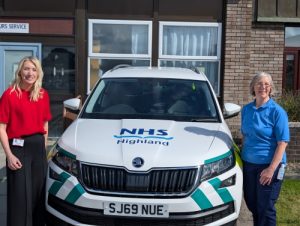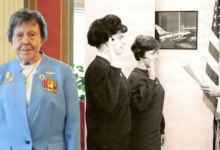Scotland nurse recounts traumatic whistleblowing experience

A nurse who suffered abuse, bullying and detriment after whistleblowing to her employer in Scotland has spoken about her decade-long fight for acknowledgment.
Annie Norman, a nurse of more than 30 years, has spoken to Nursing Times about the terrible impact a poor response to her whistleblowing had after she raised concerns about staffing and practice at her workplace.
“It made me feel as though I’ve done something wrong – and I hadn’t done anything wrong”
Annie Norman
She is telling her story now to chime with the release of a video she has recorded on raising concerns during Speak Up Month, held each October.
Ms Norman, in November 2010, had just finished a shift working as a nurse on a ward run by NHS Highland when she raised two concerns.
The first was that, the following weekend, she was the only registered nurse listed on the rota when there should have been at least two.
The second issue related to a patient and concerns Ms Norman had about their discharge.
The same evening, she received a phone call from a nursing manager who was “enormously abusive” and angry about the issues being raised, Ms Norman told Nursing Times.
She was summoned into a meeting the following day, which lasted around two hours and called into question her practice.
“[The manager] criticised me heavily, from the way I was nursing to myself as a person, and I felt thoroughly distressed and incredibly unhappy,” she said.
She was told not to attend her next weekend shift and was redeployed into a different department.
“I found this all extremely confusing. It made me feel as though I’ve done something wrong – and I hadn’t done anything wrong,” Ms Norman added.
After this, Ms Norman – with support from her husband – sought union advice. Three weeks later, another meeting was called featuring her, the nurse manager, human resources (HR) and a union representative.
This meeting, she said, ended roughly the same way – with Ms Norman leaving feeling extremely upset and distressed.
“Managers need to empathise with their staff”
Annie Norman
She spoke about what the conflict was doing to her mental health: “It had a devastating impact… my husband helped me a lot at home, he’s been unfailing in his support.”
Following this meeting an informal investigation was conducted by the board into claims by Ms Norman that she faced bullying for whistleblowing on potential issues about staffing and patient care. The investigation concluded in around April 2011 that no bullying took place.
On the advice of her union, Ms Norman requested a further – more formal – investigation by the board; this, too, concluded that she had not been bullied.
By this point, Ms Norman said her life had been turned upside down by the case and that the impact on her mental health was worsening constantly, causing to be repeatedly off sick.
“I was off sick again, but for longer,” she recalled. “It’s a bit like knocking down a brick wall – you’re strong and confident at the beginning, and then the first sickness absence takes away a layer, and the second one is even worse.”
She was redeployed a total of nine times over the course of the ordeal, including into some non-clinical posts.
At one stage, Ms Norman said she was experiencing suicidal feelings and an overall sense of helplessness due to the conflict at work.
Towards the end of 2011, Ms Norman linked up with other clinicians elsewhere in the UK who had poor experiences whistleblowing after reading about them in Nursing Times.
This, she said, kept her going at a dark point in her life: “I went to London and met a room full of people who were doctors, consultants, nurses from all over the UK; there were about 40 or 50 people in the room, including two or three from Scotland.
“That’s where my mind started to go: ‘wait a minute, this isn’t right, what NHS Highland is doing’.
“Long story short, my mental health turned a wee corner that night.”
In 2012, Ms Norman was placed on a capability action plan by NHS Highland, which was lifted in 2014 – a process she described as “dreadful”.
After this happened, Ms Norman escalated her concerns about the way she had been treated to the board’s director of nursing, something she waited to do until questions about her practice had been quashed.
“[The director of nursing] was very kind to me,” Ms Norman said. “She took me seriously.”
Around this time, Ms Norman said she also received help from her local MSP, experienced national whistleblower campaigners and others within the healthcare community.
“I admire her openness in sharing her painful experience in such a public way”
Julie McAndrew
After that, Ms Norman was redeployed for a final time to infection control, an area of nursing in NHS Highland in which she remains happily working to this day.
Despite this, it would still be years until Ms Norman gained final closure on her case.
In the time between her raising the initial complaint, and a resolution, she said she had 39 management meetings, dozens of occupational health appointments, GP reviews and therapy sessions – an experience she said left her traumatised and still processing it all.
In 2019, the Sturrock Review into a culture of fear, intimidation and bullying at NHS Highland was published.
Part of the report’s recommendations was to set up a compensation scheme, known as the “healing process”, for hundreds of staff who were “intimidated, undermined [and] disregarded” when they raised concerns.
Ms Norman said that the Sturrock Review led to her case being looked at a final time, and that it found that she had in fact been bullied for blowing the whistle.
She was given compensation in 2022 as part of the healing process.
Ms Norman described the entire, roughly 12-year experience as “terribly painful”, and acknowledged that not every nurse who has experienced detriment or bullying after whistleblowing was able to get compensation at the end of it.
Since then, she has worked with Scotland’s public services ombudsman, in their role as the country’s independent national whistleblowing officer (INWO), to tell her story and raise awareness about the need to better support NHS staff who raise concerns.

From left, Julie McAndrew and Annie Norman
Today, the INWO has published a video featuring Ms Norman outlining her story as part of the organisation’s Speak Up Week, which runs until 4 October to coincide with national Speak Up Month.
In the video, Ms Norman acknowledged that her health board had turned things around in recent years: “I feel that NHS Highland has made a terrific step forward in the last couple of years.
“Managers need to empathise with their staff, demonstrate their confidentiality and show that no matter is too small to talk about.”
Julie McAndrew, a speak up guardian and confidential contact for The Guardian Service, accompanied Ms Norman in the video and said: “I am grateful to Annie for her courage and commitment in speaking up.
“I admire her openness in sharing her painful experience in such a public way. I am also encouraged by her positivity and that the work done by NHS Highland has created an environment where she felt able to speak.”
Louise Bussell, NHS Highland director of nursing, said of Ms Norman’s case: “We at NHS Highland have worked hard over the past few years to make sure colleagues know how to speak up and feel safe to do so.
“This has included changing procedures and processes, rolling out training and communicating how concerns should be listened to.
“We are grateful to Annie for sharing her experience, so that we can continue to learn and improve,” she added.







